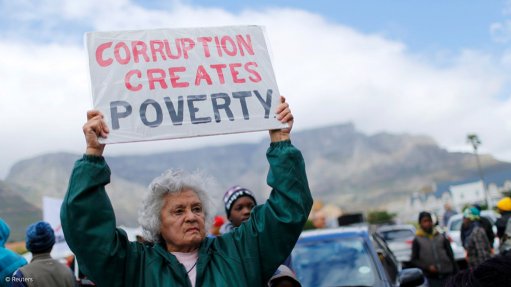Fake news and Elections 2024
Disinformation by political actors is not a new phenomenon to South Africans. Six short years ago, Bell Pottinger, the Guptas’ now defunct UK communications consultancy, executed a spirited campaign to stir up racial tensions as its principals allegedly went about capturing the State and parastatals.
Disinformation, especially through social media, has been used widely across the world to influence electoral outcomes. A recent example is a doctored audio message circulated last month in which a voice was edited to sound like US President Joe Biden urging New Hampshire voters in a telephone message not to cast their ballots in his Democratic Party’s primary election.
“Save your vote for the November election,” the phone message went. It even used one of Biden’s signature phrases: “What a bunch of malarkey!”
In reality, Biden, who will be seeking a second term in November, was not on the ballot in the New Hampshire race, and voting in the primary election did not preclude the voters from participating in the November election.
Deepfakes such as the purported Biden phone message are created using artificial intelligence – specifically deep learning algorithms – that can manipulate or generate images, videos or audio recordings that appear authentic.
A key concern, especially this year, when about four-billion people in more than 50 nations go to the polls, is that deepfakes could be used to create fake interviews or speeches where electoral candidates are depicted as saying or doing something they never did.
Disinformation was highlighted in a World Economic Forum (WEF) report unveiled at the body’s jamboree in Davos, Switzerland, last month as the world’s most severe risk over the next two years.
“Societies could become further polarised as people find it harder to verify facts [which] means that democratic processes could be eroded,” said Carolina Klint, an analyst at global insurance and risk advisory firm Marsh, whose parent company, Marsh McLennan, co-authored the WEF report.
It’s against this background that I doff my hat to the South African National Editors Forum (Sanef) for hosting a workshop last month to prepare the media for, among others, disinformation and misinformation (the inadvertent spreading of wrong information) as well as intimidation ahead of this country’s elections in a few months.
That Sanef took the trouble to hold the workshop, where speakers included representatives of multiple entities – including the Independent Electoral Commission, lawyers and media academics – is commendable. As study upon study has shown, while technological advances have made it possible for anyone to circulate their version of the ‘truth’ on social media, the impact would be minimal if disinformation was confined to social media and did not find its way into conventional media.
This view has two elements to it. First, social media users tended to inhabit ‘echo chambers’, whereby they mostly expose themselves to messages from like-minded individuals or share messages with such individuals, meaning that the chances of disinformation spreading beyond the echo chamber are quite low. Second, algorithms expose us only to the type of online information that we tend to prefer. This ‘filter bubble’ effect implies that an online content consumer is unlikely to be exposed to disinformation that falls beyond his or her preferred content type.
Disinformation (aka fake news) is reproduced in mainstream media – newspapers, magazines, radio and television, as well as Web-based media outlets – for several reasons, one of which is a sense of professional duty on the part of mainstream journalists to rebut fake news, as a result of which they inadvertently spread it further.
Second, fake news tends to meet several journalistic newsworthiness criteria, including negativity, as it is mostly uncharitable about the targeted individuals; conflict, because of the expected rebuttal by the targeted individuals; and magnitude, given the large number of people who read fake news online.
Moreover, social media and other online platforms have become an important source of news for mainstream journalists; as a result, they may pick up fake news and include it in their own coverage.
Here’s hoping South African journalists will avoid the above pitfalls this election season.
Article Enquiry
Email Article
Save Article
Feedback
To advertise email advertising@creamermedia.co.za or click here
Comments
Press Office
Announcements
What's On
Subscribe to improve your user experience...
Option 1 (equivalent of R125 a month):
Receive a weekly copy of Creamer Media's Engineering News & Mining Weekly magazine
(print copy for those in South Africa and e-magazine for those outside of South Africa)
Receive daily email newsletters
Access to full search results
Access archive of magazine back copies
Access to Projects in Progress
Access to ONE Research Report of your choice in PDF format
Option 2 (equivalent of R375 a month):
All benefits from Option 1
PLUS
Access to Creamer Media's Research Channel Africa for ALL Research Reports, in PDF format, on various industrial and mining sectors
including Electricity; Water; Energy Transition; Hydrogen; Roads, Rail and Ports; Coal; Gold; Platinum; Battery Metals; etc.
Already a subscriber?
Forgotten your password?
Receive weekly copy of Creamer Media's Engineering News & Mining Weekly magazine (print copy for those in South Africa and e-magazine for those outside of South Africa)
➕
Recieve daily email newsletters
➕
Access to full search results
➕
Access archive of magazine back copies
➕
Access to Projects in Progress
➕
Access to ONE Research Report of your choice in PDF format
RESEARCH CHANNEL AFRICA
R4500 (equivalent of R375 a month)
SUBSCRIBEAll benefits from Option 1
➕
Access to Creamer Media's Research Channel Africa for ALL Research Reports on various industrial and mining sectors, in PDF format, including on:
Electricity
➕
Water
➕
Energy Transition
➕
Hydrogen
➕
Roads, Rail and Ports
➕
Coal
➕
Gold
➕
Platinum
➕
Battery Metals
➕
etc.
Receive all benefits from Option 1 or Option 2 delivered to numerous people at your company
➕
Multiple User names and Passwords for simultaneous log-ins
➕
Intranet integration access to all in your organisation


















